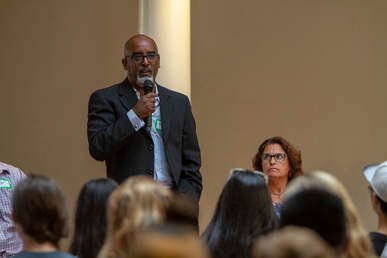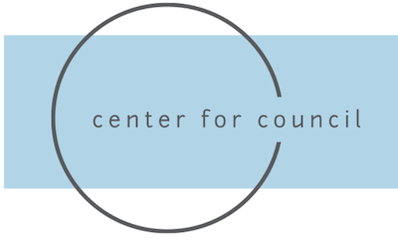 Ray Tucker is one of Center for Council’s senior trainers. A former law enforcement officer, Ray leads Council trainings for incarcerated men in prisons across California as part of our Inmate Council Project. He has also trained numerous professional organizations in the Southern California region, helping them to integrate elements of the Council practice into their company culture. We sat down with Ray to learn a bit more about how he first found the Council practice, and what propelled him to want to become a Council trainer. Center for Council: What was it that encouraged you to make the shift from working in law enforcement to facilitating Council circles? Ray Tucker: In January of 1994, I had an experience as a police officer, that no academy ever trains you for. They train you to shoot, but they don’t train you to know what it feels like to shoot someone. They cannot prepare you for what that experience is like. For the next five or six months, I wasn’t able to talk to anyone about how that incident affected me and impacted my life as a police officer as well as my personal life. I carried that experience with me. My work ethic declined, I started showing up late for work, sometimes I didn’t bring my weapon home. There were times when I went to work with no bullets in my gun. I went through a period of not being able to make decisions in my life, big or small. I couldn’t even decide what clothes to wear. I didn’t feel like I had a safe place to go to talk about what I was experiencing. I didn’t feel like I could share with other officers what I was going through, so I didn’t say anything to anybody. About a year later, after much thought, I decided that it wasn’t safe for me, or for my fellow officers, to continue working on the force, so I retired. In 1995, I was looking for an ethnically diverse middle school for my daughter. One of the schools I was considering, Palms, had just started a Council program the year prior, which really interested me. In my research before enrolling her in that school, I had the opportunity to sit in a parents’ Council circle. At the end of that Council I felt so connected to the parents and so connected to the school itself. I decided to send her there and join the Council program as an intern to learn how to facilitate Council circles in the school myself. I’ve been doing Council ever since that time. What drew you to become a Council trainer? Since I had retired from law enforcement, I was looking to do something that would make a difference in the lives of young people. A really positive difference. In addition to the regular parents Council at Palms, all 6th and 8th graders were also participating in Council. I would sit in the classroom and observe the Council circle with students and learn from the experienced facilitator that was leading it. After about two years of interning, I became a co-director of the Council program at Palms. Did you feel that something shifted in you after that first Council circle, or as you began to understand the practice more? I don’t know if something changed in me, but Council spoke to me. I immediately felt how amazing it was to listen to the stories of others and realize how connected we are even though we don’t know one another. After being involved in Council, I truly believe that, if there had been a program available for officers that allowed them to openly talk about what was going on and what they were going through, I could have stayed in law enforcement. Council would have been an opportunity for me to really verbalize and express what I was actually going through. I think having a program like Council could be so beneficial to officers who might be going through something similar, or might just need a way to be more deeply connected to one another. What did you daughter think of Council? Did she take to the practice as well? She took to it immediately. It helped her integrate into the middle school experience in a healthy way. I think Council helped her find her voice and learn about other people in an organic environment. She was able to develop friendships and relationships with people she didn’t know before. At that time at the school, it was 30% African American, 30% Caucasian, 30% Hispanic, and 10% other so it was a really rich opportunity for her to learn about other people with other backgrounds. What was the Council practice like in schools? Did the students enjoy it? It built a culture of caring amongst the students and a sense of being connected not only to one another but also to the staff and teachers, because the teachers were able to share their stories in the Council circle as well. One weekend someone sprayed graffiti in the school and when the kids came back and saw it they were really upset about it. The student who had done the graffiti happened to be in my Council circle. We held a Council about the incident, both for the students who were angry about what had happened and for him as well. He was able to come and sit in Council and talk about what he did and why he did it, and it really helped the kids heal around the incident because they were able to hear his story. It was so beneficial for him too, to have the courage to share that story and have his story be accepted by his peers. It was really healing for everyone.
1 Comment
|
Categories
All
Archives
March 2024
|
|
|
About |
|

 RSS Feed
RSS Feed
